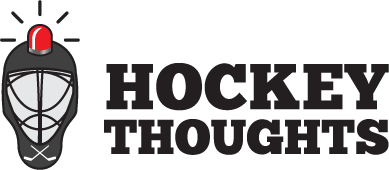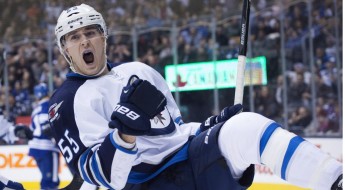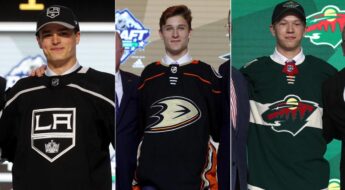Florida’s season hinges on forward health, depth
The Florida Panthers might have completely blew it just like the Avalanche did. In 2014 Colorado made the playoffs for the first time in ages, then promptly degraded their roster until Patrick Roy was forced to resign.
The Panthers lost Jonathan Marchessault, Jussi Jokinen, Jaromir Jagr, and Reilly Smith from last year’s team. To offset that loss, they’ve added Evgeni Dadonov, Radim Vrbata, and an import from the Finnish League, Henrik Haapala. That’s a lot of offense to replace.
Offensive depth is required to win Championships. The Panthers have some nice pieces with Huberdeau, Barkov, Trochek, and Bjugstad. But other than Barkov who should morph into (or already is) an elite talent, the other three are not the “franchise players” required to win Stanley Cups. That’s not to say that Reilly Smith and Jonathan Marchessault are, but the only way to combat a lack of elite talent is to have capable scoring depth throughout the lineup.
Dadonov and Haapala are wildcards, but could be up to the task of providing capable scoring depth. If not, the Panthers hopes of building on their 2015 playoff appearances become slimmer by the minute.
They do, however, have a fantastic core of defensemen that will continue to grow deeper as they mature, but losing four proven offensive players from last year might be too much for this squad to overcome.
Offensive Rating + Formula
Each player will have two ratings: a Current and Potential rating.
Denis Malgin for example, is a 3+, 1?. This means currently he is an offensively oriented top-9 forward, but has the potential to contribute as a top line player. The question mark means he may drop a rating or two.
Click here for more about Current and Potential Ratings.
Huberdeau 1, 1 – Barkov F, F – Dadonov 2?, 1?
Haapala 3+, 3+ – Trocheck 2, 1 – Vrbata 2, 2
McCann 4, 2 – Bjugstad 2, 2 – Hawryluk 3+, 2
Malgin 3+, 1? – MacKenzie 3, 3 – Sceviour 3, 3
Hunt 4, 3+ – Haley 4, 4 – McGinn 3, 3
The Panthers will rely dearly on the health of Huberdeau and Barkov, which in recent times has been been far from dependable. Huberdeau played just 31 games last year, so him remaining healthy would be a good starting point. Barkov suited up for 61 games and has never played more than 71 over his four NHL seasons. If he can push the 80-game milestone, though, he should have no problem pushing 30 goals and 75 points.
Then comes the depth. Nick Bjugstad was looking like a budding top line center in 2015 when he scored 24 goals, but followed it up with 15, then 7 last year. I’m willing to look past last year, as the previous three years he averaged 18 goals, but at 25 years old it’s time to find out: is he a good second line center, or just a solid third option? He’ll have to let us know.
Sticking to center ice, Vincent Trocheck has been a delight to watch, combining hard work with a nose for the net despite his smallish stature at 5’10”. He clearly earned the coach’s trust last year, averaging nearly 21 minutes per game, 6th in the league among forwards.
This offense group is currently lacking proof, but could be serviceable if Dadonov and Haapala can swing it at the NHL level. If those two fail to perform at their 2?, and 3+ ratings though, then the Panthers offense could be even thinner.
Forward Ranking: Weak (27th of 31)
Defense Rating + Formula
Yandle 1, 1 – Ekblad F, F+
Matheson 2, 1? – Petrovic 3, 2?
Pysyk 3, 2? – McCoshen D, 3!
Ekblad is 21, Matheson is 23, and Pysyk and Petrovic are both 25. I’d expect the Panthers would be happy with those four over the next 5 years.
Matheson has already proven he can handle over 20 minutes per game, transitioning smoothly after his first year in the AHL. He looks excellent, but Pysyk and Petrovic are not to be overlooked either. They both put up offensive numbers in junior, have been solid in the AHL, and have shown the defensive reliability required to earn more than 18 minutes per game over time. As they reach their prime of 27-29 years, they certainly could prove more than just 3rd pairing d-men.
Yandle and Demers, in the meantime, are solid veterans to plug the gaps and round out the top-4. The Panthers have this going for them: not a single weak link on the back-end. Teams like the Predators and Flames have gone defense-heavy and prioritized icing a strong top-6.
Can it pay off for Florida in a similar fashion?
Defense Rating: Solid (19th of 31)
Goaltending Rating + Formula
Luongo 1, 1 – Reimer 2, 2
Long live Roberto Luongo. I grew up in British Columbia so I’ve seen him play a lot. He’s the bomb, and his twitter account is wonderful.
But, his save percentage declined last year to .915 after two consecutive seasons of .922. Is that Father Time speaking to Roberto about declining athleticism, or is that the hockey gods telling him that when your team gets worse, so does your save percentage?
I’m leaning toward the second. Sure, Luongo is 38 years old, but he’s going to have to have some consecutive poor seasons before I’m comfortable dismissing him. I’m sure local fans are fine with him manning the pipes.
James Reimer waits behind – yet another goaltender mistreated by the Canadian media. Over the previous two seasons, he’s started 76 games. 29 with Toronto, 8 with San Jose, and 39 with Florida last year. His numbers over that time? A 2.42 GAA and .921 save percentage.
Yes, he’s never started more than 40 games in his career. But whenever Luongo needs to refocus, Reimer should be at least a serviceable complement.
Goaltender Rating: Solid (17th of 31)
Intrigue
Henrik Haapala came over from Tappara Tampere in Finland and put up 15 goals and 45 assists in 51 games. Scoring nearly an assist per game in any top professional league is an accomplishment, but how will it translate to North America? Mats Zuccarello, for example, put up 41 assists in 55 games in the Swedish League before joining New York. I’d say he’s proved that he’s a capable play maker in the NHL, and Haapala is still just 23 year old. Can he make an impact with the big boys?
Then we have Evgeny Dadonov. He has 55 games of NHL experience from 2009-10 to 2011-12, and his best showing over that span would be eight goals and 17 points in 36 games.
For whatever reason, North America didn’t quite work out, and he hopped on a plan back to Russia. Over his first two seasons back home, he was good, averaging 33 points in 53 KHL games. His final three seasons, though, were excellent – albeit with SKA St. Petersburg, a KHL powerhouse. This past season he played with Ilya Kovalchuk, Pavel Datsyuk, Vadim Shipachyov, and others. Their team was obviously one of the best in the league.
This is where he scored 158 points over 165 games, including 30 goals and 66 points in 53 games last year.
So what can Dadonov do back in North America? He’s in the prime of his career at 28 years old, and has a 3-year deal worth $4-million per season, so Florida is keeping him regardless. Are his numbers the benefit of playing with a powerhouse? Heck, do his numbers mean anything? I don’t know. But I’d consider 20 goals and 20 assists a success this year, and realistically anything over 40 points over his contract has to be considered a success.
For Florida to make any long-term progress, their forward group must continue to improve. They gave Jared McCann some seasoning in the minors after the Canucks rushed him into the NHL at 19 years old. The Panthers also have Denis Malgin, a 5’9″ forward that performed well in the AHL and didn’t look out of place in 40 NHL games.
If McCann and Malgin can morph into top-6 forwards over time, the Panthers might be able to rebuild a group deep enough to contend for the playoffs again.
Until then, Dadonov, Haapala and Vrbata will have to make up for an assortment of departed talent.
5 Most Valuable Assets
Aaron Ekblad F, F+
Aleksander Barkov F, F
Jonathan Huberdeau 1, 1
Vincent Trochek 2, 1
Owen Tippett D, F??
Top 3 Prospects
RW, Owen Tippett D, F??
C, Henrik Borgstrom D, 1??
LW, Denis Malgin 3+, 1?
Prediction
The Panthers have solid goaltending, a deep group of defensemen led by a star, but their forward group will have plenty to prove in 2017. The Panthers may surprise if the top of their lineup can stay healthy for once – Barkov and Huberdeau both played less than 70 games last season. If that’s the case, Barkov is ready to explode into a top tier centerman.
It’s possible for this team being considered deep down the middle with Barkov, Trochek, and Bjugstad, who’s under-performed recently. If Bjugstad finds his form again Florida could sneakily boast a fantastic trio of centermen. And, if you’re going to have shallow group of top forwards, you certainly don’t want it to be light up the middle.
If Bjugstad continues to regress, though, and Haapala, Malgin, or Dadonov can’t replace the 72 goals and 162 points that departed this off-season, then this team will have to win smart defense and stellar goaltending.
Offense: Weak (27th of 31)
Defense: Solid (19th of 31)
Goaltending: Solid (17th of 31)
Verdict: 7th in the Atlantic Division
Playoffs: Not this year. If their forward group can take a step forward, there are no questions on the back line or in net, and they should compete for the playoffs from 2018-19 and onward.
You can find the rest of our Franchise Previews here.
*This depth chart has been updated to relfect the September 17 trade between the Panthers and Coyotes. Jamie McGinn for Jason Demers



